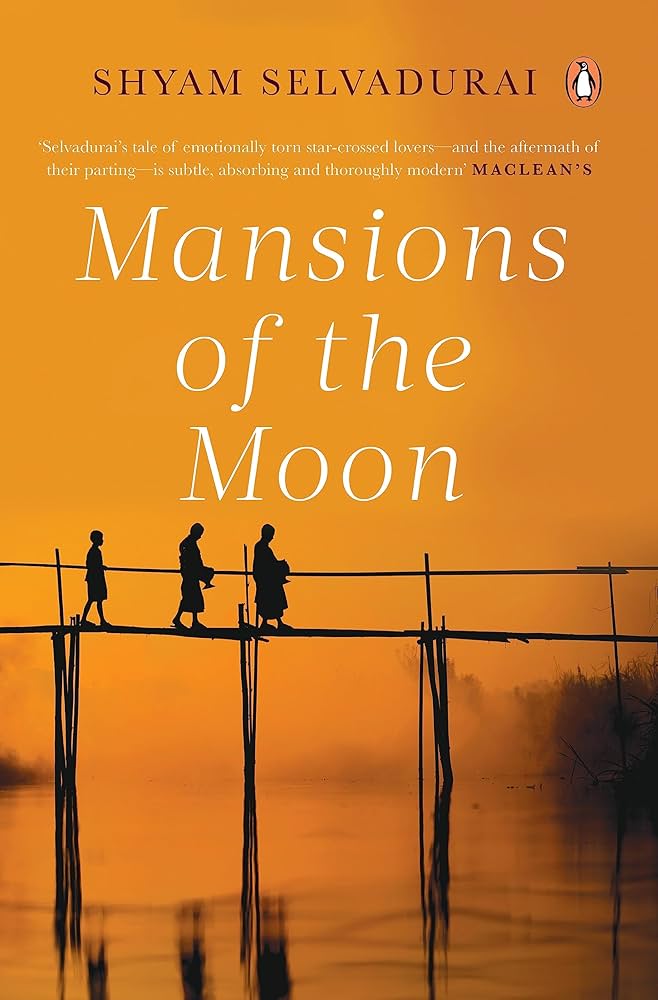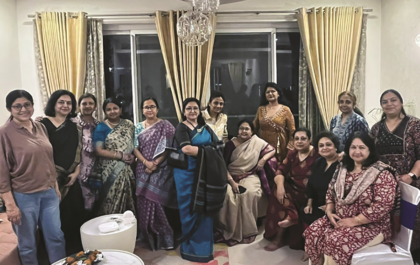Our book selection for this October was Mansions of the Moon, a novel by Shyam Selvadurai, a Sri Lankan Tamil author residing in Canada. The book offers an alternative perspective on a historical and religious luminary, Gautam Buddha. The narrative diverges from the typical story of an isolated prince raised in a cocoon of luxury. Instead, it portrays a young boy blamed for the death of his mother during childbirth, subsequently subjected to physical and emotional abuse at the hands of his father and abject neglect by his stepmother, who suffers her own set of humiliations when compelled to take the place of her sister (Yashodhara’s aunt) after her death.
In contrast to the Siddhartha portrayed in most historical texts — a reclusive prince raised in a luxurious palace, initially blissfully unaware of all suffering until he was confronted by the reality of sorrow, illness, ageing, and death during an incidental jaunt outside the palace walls — Selvadurai delivers a Siddhartha who is forced to confront the harshness of the world at an early age. As a leader, required to interface with sages, and ascetics and enforce harsh discipline on his civilians, leaves him disillusioned, disturbed, and yearning to learn the true meaning of life. So much so, that he takes the extreme step of abandoning his wife and newborn son to seek the ultimate truth, and after severe meditation comes back as a loving, forgiving, and caring monk to preach to the world the Middle Path of Buddhism!
The book’s true heroine is Yashodhara, Siddhartha’s wife — who was an otherwise unremarkable figure in history. Although women in 500 BCE were second-class citizens, this author fashions Yashodhara in a modern light. She actively challenges and contradicts her husband, driven by warring feelings of love, anger, and resentment towards her husband (at one point, wishing death on him!). Her efforts in advocating for women to be accepted into the monastic fold as Sadhavis (Bhikkhunis) is nothing short of an Amazonian effort — while acknowledging that Bhikkhunis were still subservient to the male monks. She, however, accepts the Buddhist Middle Path, and performs the supreme sacrifice of letting her son go, while teaching him to be independent of her!
Shyam Selvadurai has captured the era with visceral and evocative language. We get descriptive images of towns and villages, the political and governing structure of the epoch, lives of courtesans who were not only sexual slaves but also power mongers, capable of changing the destinies of kingdoms, as well as cruelty and manipulations of warring rulers.
What makes this book club interesting and exciting is our observations, opinions and comments on the plot, the characters, the writing style, and political and social implications to name a few. Questions that we submit before the meeting add spice to our discussion.
During this discussion, some of us questioned the historical accuracy of the novel, despite knowing that it is fiction. Some questioned the audacity of the author to depict Buddha in a different light from the history we know. A few commented on how such fictionalised historical novels colour our views of the protagonists and the times in such a way that they deviate from real history.
Most of us (not all) enjoyed the way Selvadurai depicted Yashodhara’s character. We touched upon the tenets of Buddhism and a bit of Advaita philosophy.
Even though it is fiction, the author has done extensive research of the times and, in my mind, his book gives a plausible explanation of Siddharth’s turmoil towards spiritual awakening, besides giving a possible insight into the pathos and struggles of his otherwise unknown wife.



Popular Stories
Football Tournament @Princeton
More Than a Festival: The Art and Power of Durga Puja
Personality of the Month- ‘Dr Usha Mediratta’
Stray Cattle Menace In Front of Galleria
The Chronicles of Malibu Towne: A Mosquito’s Tale
“Senior Living Is Not An Old Age Home” say Mr & Mrs Bose
Recent Stories from Nearby
- Promises Repair of Broken Park Walls, Installation of Boom Barriers, Deep Cleaning of Drains… Among Other Things January 30, 2025
- Anand Niketan Club’s Grand New Year’s Eve Bash January 30, 2025
- Residents Come Together for a Night of Fun and Festivity January 30, 2025
- Rising Incidents of Harassment by Transgender Groups Raise Concerns in Delhi NCR January 30, 2025
- From Banana Races to Hurdles: ANRWA Sports Meet Had It All January 30, 2025







